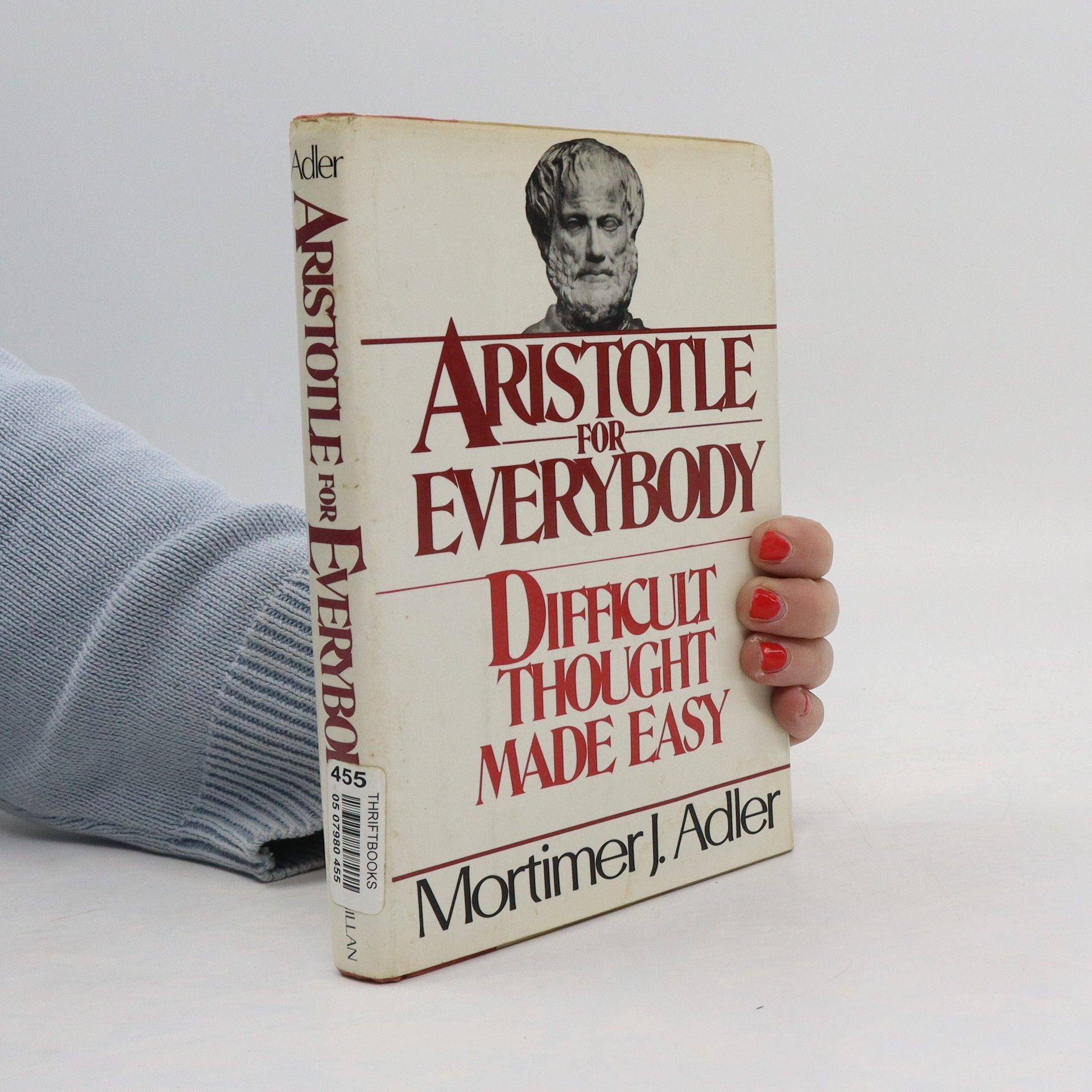Aristoteles (384–322 v. Chr.) lehrte Alexander den Großen die Logik und durch seine philosophischen Werke jeden Philosophen seither, von Mark Aurel über Thomas von Aquin bis zu Mortimer J. Adler. Jetzt lehrt Adler – einst Vorstandsvorsitzender der renommierten Encyclopedia Britannica – die Welt die aristotelische Logik, indem er Aristoteles’ Erkenntnisse in einer aktuellen, wunderbar verständlichen Weise präsentiert. Er bringt Aristoteles’ Werk auf eine alltägliche, für jeden verständliche Ebene – »to go«, wie auf einen schnellen Kaffee mit Aristoteles. Indem er die Leser ermutigt, selbst philosophisch zu denken, bietet Adler uns einen einzigartigen Weg zu persönlichen Einsichten und zum Verständnis der grandiosen aristotelischen Philosophie, wie der Unterschied zwischen Wünschen und Bedürfnissen, der richtige Weg zum Glück und der richtige Plan für ein gutes Leben.
Mortimer J. Adler Bücher
Mortimer Adler war ein amerikanischer Pädagoge und Philosoph, der sich der Aufgabe widmete, komplexe Ideen einem breiten Publikum zugänglich zu machen. Seine Werke schöpften aus der aristotelischen und thomistischen Denktradition, waren aber in einer Sprache verfasst, die sich an Leser außerhalb der akademischen Welt richtete. Adler wollte den Menschen Werkzeuge für besseres Lesen und Verständnis anspruchsvoller Texte an die Hand geben und so ihr intellektuelles Engagement fördern. Seine lebenslange Mission war es, die Philosophie mit dem Alltag zu verbinden und zu tiefgründigem Nachdenken anzuregen.






Wie man ein Buch liest
- 385 Seiten
- 14 Lesestunden
„Wie man ein Buch liest“ von Mortimer J. Adler und Charles van Doren ist eine Anleitung zur Verbesserung der Lesetechniken. Seit 1972 ein Bestseller, bietet es eine Systematik, um Belletristik sowie komplexe Texte besser zu verstehen und die eigene Lektüre zu perfektionieren.
The Great Ideas, Vol. 2
A Syntopicon of Great Books of the Western World
54 volume series of the Great Books, published by Britannica.1. The great conversation / by R.M. Hutchins 2-3. The great ideas 4. The Iliad of Homer. The Odyssey 5. Aeschylus. Sophocles. Euripides. Aristophanes 6. Herodotus. Thucydides 7. Plato 8-9. Aristotle 10. Hippocrates. Galen 11. Euclid. Archimedes. Appollonius of Perga. Nicomachus 12. Lucretius. Epictetus. Marcus Aurelius 13. Virgil 14. Plutarch 15. Tacitus 16. Ptolemy. Copernicus. Kepler 17. Plotinus 18. Augustine 19-20. Thomas Aquinas 21. Dante 22. Chaucer 23. Machiavelli. Hobbes 24. Rabelais 25. Montaigne 26-27. Shakespeare 28. Gilbert. Galileo. Harvey 29. Cervantes 30. Francis Bacon 31. Descartes. Spinoza 32. John Milton 33. Pascal 34. Newton. Huygens 35. Locke. Berkeley. Hume 36. Swift. Sterne 37. Henry Fielding 38. Montesquieu. Rousseau 39. Adam Smith 40-41. Gibbon 42. Kant 43. American state papers. The Federalist. J.S. Mill 44. Boswell 45. Lavoisier. Fourier. Faraday 46. Hegel 47. Goethe 48. Melville 49. Darwin 50. Marx 51. Tolstoy 52. Dostoevsky 53. William James 54. Freud.
Drawing on his extensive knowledge of Western literature, philosophy, and history, Adler considers what is meant by democracy, law, emotion, language, truth, and other abstract concepts in light of more than two millennia of Western civilization. 15 photos.
Six Great Ideas
- 256 Seiten
- 9 Lesestunden
Each summer, Mortimer J. Adler conducts a seminar at the Aspen Institute in Colorado. At the 1981 seminar, leaders from the worlds of business, literature, education, and the arts joined him in an in-depth consideration of the six great ideas that are the subject of this book: Truth, Goodness, and Beauty - the ideas we judge by; and Liberty, Equality and Justice - the ideas we act on. The group discussions and conversations between Dr. Adler and journalist Bill Moyers were filmed for broadcast on public television, and thousands of people followed their exploration of these important ideas. Discarding the out-worn and off-putting jargon of academia, Dr. Adler dispels the myth that philosophy is the exclusive province of the specialist. He argues that "philosophy is everybody's business," and that a better understanding of these fundamental concepts is essential if we are to cope with the political, moral, and social issues that confront us daily.
Haves Without Have-Nots
- 337 Seiten
- 12 Lesestunden
Mortimer J. Adler's Haves Without Have-Nots is a compilation of six essays revolving around a unifying theme: the convergence of capitalism and socialism in a politically and economically democratic world society, the likes of which has never been seen until now, as the 20th century draws to a close.
"Adler traces 'in the simplest language and with occasional modern analogues, the logic and growth of Aristotle's basic doctrines.'" Publ Wkly "Aristotle taught logic to Alexander the Great and, by virtue of his philosophical works, to every philosopher since, from Marcus Aurelius, to Thomas Aquinas, to Mortimer J. Adler. Now Aler instructs the world in the 'uncommon common sense' of Aristotelian logic, presenting Aristotle's understandings in a current, delightfully lucid way ... Adler offers us a unique path to personal insights and understanding of intangibles, such as the difference between wants and needs, the proper way to pursue happiness, and the right plan for a good life."
How to Speak. How to Listen
- 288 Seiten
- 11 Lesestunden
Drawing on decades of experience as an educator and philosopher, Mortimer J. Adler gives a short course in effective communication, invaluable for salespeople, negotiators, teachers, and families seeking better communication among themselves.
Paideia Proposal
- 96 Seiten
- 4 Lesestunden
Focusing on a democratic approach to education, the proposal advocates for a liberal education accessible to all children, countering outdated 19th-century practices. It emphasizes that every child is educable and that learning is a lifelong journey, facilitated by active engagement rather than traditional teacher-led instruction. The framework encourages diverse teaching methods and prioritizes enduring values over mere vocational training. Adler's vision aims to cultivate informed citizens, rejecting elitism in favor of inclusivity in educational opportunities.
Recognized for its cultural significance, this work contributes to the foundational knowledge of civilization. It has been chosen by scholars for its importance, highlighting its relevance in understanding historical and societal contexts.


